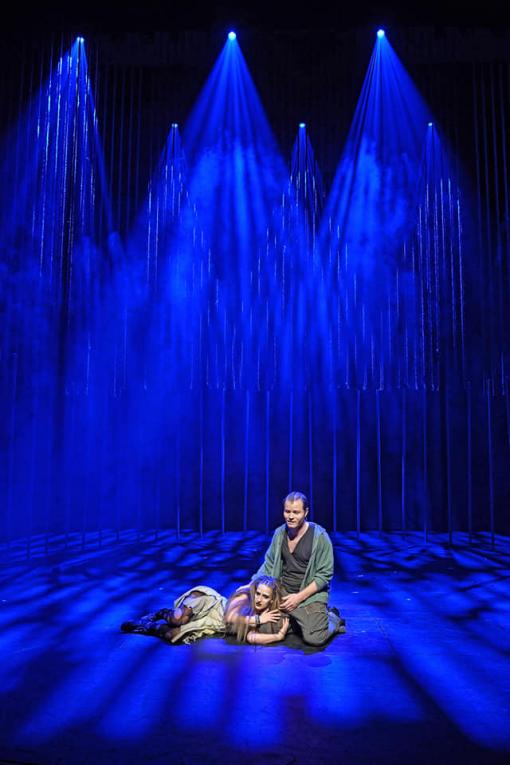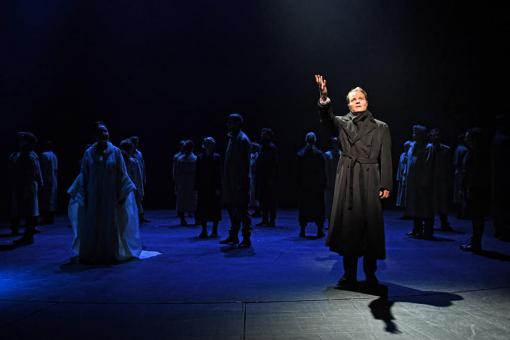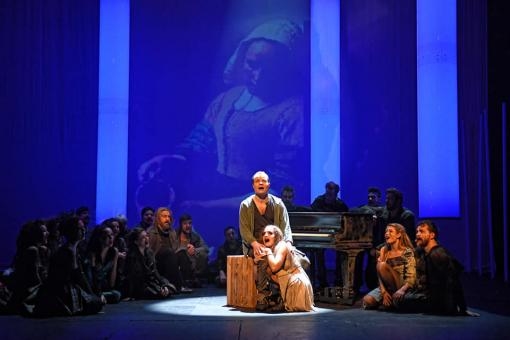A fateful comedy, the third part of a musical trilogy or a fantasy musical. These attributes define Paradise, a new authorial piece from the workshop of Zdenek Merta and Stanislav Moša. Their ninth joint work in the field of music theatre was premiered yesterday on the big stage of the Brno City Theatre. The result is embarrassing.
It will be honest to admit at the very beginning that the most troublesome issue of the whole production is its scenario: both in terms of architecture but also, in places, because of its linguistic implementation. Stanislav Moša was inspired by an event, which took place in 2017, when a live orchestra in Italy was conducted by a robot. And this fact stood at the beginning of the assembly of a somewhat overcombined story of the future. The main character of this strangely laid-out story, which takes place decades after a mysterious disaster, is Ruden, an aged man, once a brilliant pianist. He meets a boy who accidentally finds a functional piano in the ruins of the city and learns to play it. Another theme of the piece is the boy's love for a young dancer, and indeed the strongest human feeling in general. And all this is happening in the settings of a world destroyed by despotic robots and increasingly dominated by a mysterious extraterrestrial civilization. Screenwriter Moša goes back to the future to tell about the presence of some pictures staged in the spirit of his authorial fascination of human society during a period of crisis or ruin. Time and dramatic travel in it is really free to handle here. The spectator watches the protagonist Ruden in three of his lifestyles - a little boy, a young man and an elderly guy. The motto of the performance is the sentence “… once aliens from the universe appear on earth, music will becomes the means of communication…” And since Moša, as a dramatic author, wants to be the apostle of love, art and humanity, infinity of themes falling under the above sentence are discussed here.

In addition to the tyranny of artificial intelligence (which people have created and now have to face the consequences), there is of course the most powerful human sentiment, for which the machines logically do not have any understanding (the brutality of robots is represented here by their harsh selection of people in internment camps – pregnant women have their embryos forcibly taken away), and in some places profound discussions are staged on hope and good life, or even telepathy is used dramatically. This happens when the Blue (a mysterious extraterrestrial civilisation), after communicating with Malej through the sounds of the piano, suddenly god-knows-why fly away and leave the previously controlled humanity to its destiny. However, Malej has a message for his companions from them. "They said it this way... that if we weren't stupid, we could live here like in paradise." This is the buried he dramaturgical credo and the message of the production. I was not artistically impressed by having to chew my way to this simple or even banal message through an overexpanded and overcombined story.
And this poor libretto structure is not improved even by Moša as a poet. In the songs I was struck by verses such as „Ještě je malej. Náš Malej.“ ["He's still small. Our Malej."], "Malej" being the Czech for "Small". You do not have to lie in Mácha or have read all of Skácel to have such combinations make you laugh unwantedly. Similarly, there is a metaphor or natural lyricist that sounds here often and too sweetly with thyme, camomile, young fairies "showering in the mists of sins" or rhymes such as "happy moments – sleep my little one". Less of everything, from the plot to the song lyrics, would mean more benefit for the authors and, consequently, for the audience.

I do not know why at the premiere of Paradise I thought of Koyaanisqatsi, a film essay from 1983, which deals with the relationship between man and modern technology, civilisation. The excellent film (the languages of film and theatre are, of course, quite different) touched on similar themes as here: however, it did not do so with cumbersome literalism, but had the contemplative lightness of a successful poem. The music for the film was composed by Philip Glass. The music by Zdenek Merta is one of the best things you find in Paradise and you will hear everything that such a future musical requires: there are (possibly overused) choir dances where interjections such as Ayhey, Ayhay or Ayeah Digidum Wayeah strike the tones while possibly stomping and beating the stage with rods; there is a love duet and even a defiant drinking song of Petr and Malej. In places you will hear the tunes of a melodramatic symphony, at other times a rhythmic song referring to folk roots. Everything is played by a hidden thirty-one-member orchestra on the horizon of the stage, which is revealed only once by the director witfully and humorously when a young virtuoso performs with a conducting robot. There is quite a lot of Merta's music for the musical (combining sung and spoken word) – there are thirty-eight music numbers. Fortunately, the music sometimes hides holes in the scenario, which is dominated by really short dialogues.
The simple abstract stage design by Moša's collaborator Christoph Weyers uses rods and simply hung ropes. The stage designer tries to revive this emptied space with neon cylinders (the presence of the Blue). At other times, the scenes are complemented by screenings of Petr Hloušek's projections around the portals. The stage thus comes to life with decors, the meaning of which has remained unknown to me.
It is no big discovery that Moša has a top ensemble and performers who, by their performances, can overshadow or divert the viewer from possible embarrassment and shortcomings of the work itself. The commitment with which Lukáš Janota, Dušan Vitázek, Viktória Matušovová, Markéta Sedláčková and Dagmar Křížová sang during the premiere made it possible to forget for a moment about the above-described shallowness of this play.
Most of the fantasy musical Paradise takes place in the Round Bowl, which is an old gas tank where young people congregate and which later turns into a concentration and internment camp of the future, where the Blue imprison crowds of unfortunate people. I did not deduce this fact from the performance itself, but discovered it only by reading the script. Without any cheap irony, I add that the very confined space or the hostile camp were reminded to me especially by the scenario.
Brno City Theatre: Paradise
Author: Zdenek Merta and Stanislav Moša
Director: Stanislav Moša
Costumes: Andrea Kučerová
Dramaturgy: Klára Latzková
Stage design: Christoph Weyers
Music: Zdenek Merta
Musical preparation: Dan Kalousek, Josef Javora
Choreography: Michal Matěj
Premiere on 8 February at the MDB Music Stage

































No comment added yet..